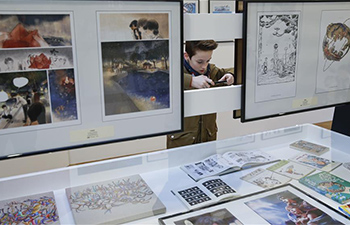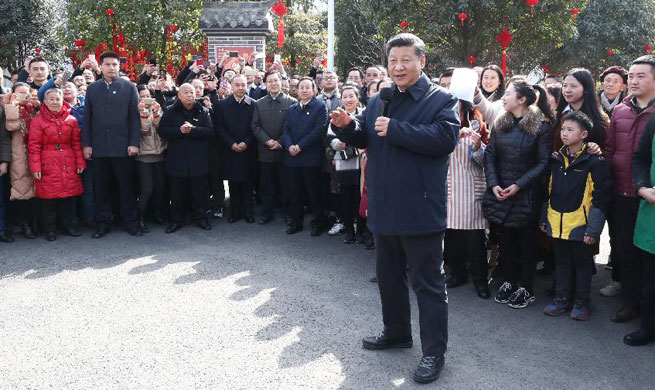GAZA, Feb. 14 (Xinhua) -- Wasaim Abdo, owner of a gift shop in the Palestinian Gaza Strip complained of low sales during this year's Valentine's Day, as the Israeli-blockaded territory is going through an unprecedented economic decline.
"Recession crushed passion," Abid, who owns a famous gift shop in Gaza City's downtown, lamented. "This is the worst season in 18 years."
Gaza has been placed under a tight Israeli blockade since Islamic Hamas movement seized the territory by force after routing forces loyal to President Mahmoud Abbas in 2007.
The blockade has pushed Gaza's 2 million populations deeper into poverty as unemployment rates hit 45 percent according to official figures.
According to international organizations and United Nations agencies, over 60 percent of the people in Gaza live in food insecurity as hundreds of thousands rely on foreign food aid.
A recent World Bank report has also said the Gaza Strip ranks third across the Arab region in terms of poverty rates after Sudan and Yemen.
Flower and gift shops turned into red as shop fronts in some Gaza upscale neighborhoods ornamented with rows of flowers and heart-shaped decorations that represent the day of love.
However, the demand since the beginning of the day was very low.
Abdo believed that the deteriorating economic conditions have forced many to rethink their spending habits, which negatively affected traders who spent much in preparation for the festivity.
"In the past years, I used to sell hundreds of gifts days before the Valentine's Day," Abdo said as he looked around for customers.
Like most of his colleagues, Abdo has prepared a variety of goods and models for the day about two months ago, but the demand went against his expectations.
"I can see that people want to buy gifts, but they prefer to spend their money on buying more important things such as food and clothes," said Abdo, who has been a leading figure in the business for decades.
Gazans started to mark the Valentine's Day when Palestinians in exiles returned from countries like Egypt, Lebanon and Syria after signing the peace accords between the Palestinian National Authority and Israel in 1994.
Internet and satellite channels have also helped spread the idea among educated secular young people.
The event is not largely observed in Gaza as the majority of people are conservative Muslims who believe that only Muslim holidays should be observed.
But still, there are some who use the occasion to escape the dire conditions of the Israeli-blockaded coastal enclave and the frequent violence with Israel that left thousands dead.
In addition to the lack of public celebrations, this year's Valentine's Day falls on Gaza amid a near-total halt of growing flowers in its fields, after decades of being among the top exporters of roses to Europe.
Flower growing in Gaza reached its peak during the period from 2003 to 2006, when more than 40 million flowers were exported to European countries.
However, exporting flowers from Gaza has declined in the past few years to some 5 million flowers a year, before it totally stopped since last year.
According to Nizar al-Wahidi, Director-General of the Ministry of Agriculture in Gaza, a total of only 10 donums (10,000 square meters) of land are currently planted with flowers in Gaza, compared to at least 500 donums in the past few years.
Al-Wahidi attributed the sharp decline in the business to the lack of fresh water quantities since the cultivation of each dunum of land needs 1,200 liters of water.
"In addition to this, Israel's restrictions on exports pushed farmers to cut down their produce after inflecting huge financial losses," he told Xinhua.

















